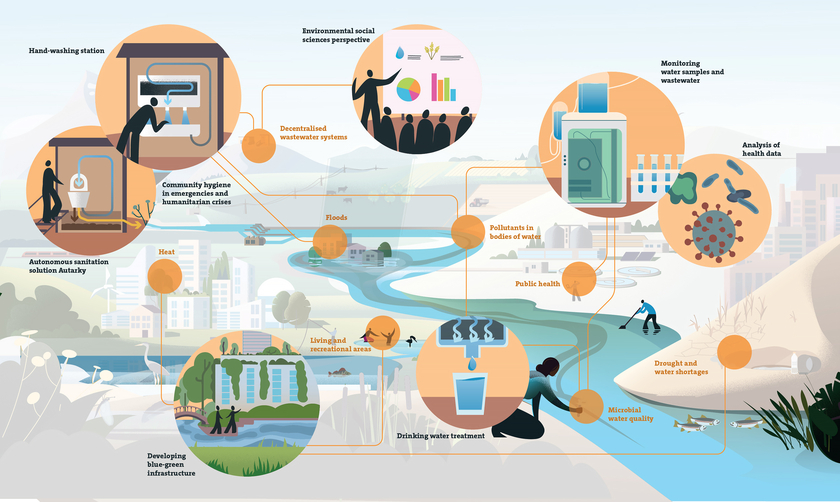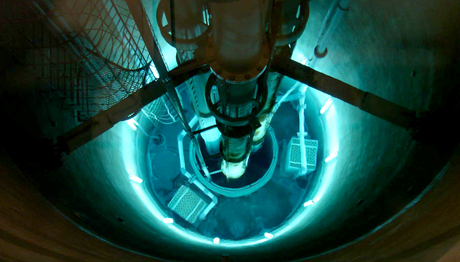Water, health and well-being
Our health and well-being depend heavily on the availability of sufficient clean water. However, around a fifth of the world’s population has no clean drinking water and around a third has no access to safe sanitation facilities. Water is one of our most important resources and access to drinking water and sanitation is a human right.
The changes in the global water cycle caused by the climate crisis are also exacerbating existing problems: flooding threatens human lives and in arid regions, the lack of drinking water is exacerbated as the scarce groundwater is also used for irrigation. Engineers, environmental experts and social scientists at Eawag are therefore using their expertise to make an active and targeted contribution to achieving access to clean and safe water.
Waterborne diseases
Hygiene measures play an important role in preventing the transmission of infectious diseases. Adequate sanitation and water infrastructures ensure that wastewater can be treated safely. Unsafe drinking water, unclean sanitation facilities and poor hand hygiene cause around one million deaths from diarrhoea every year Eawag is therefore developing innovative solutions in the areas of water supply, wastewater treatment and waste disposal, which are also being used in the Global South. For example, in Durban in South Africa, a toilet was successfully tested that directly treats wastewater, urine and faeces on site and therefore does not require an external connection to the drinking water and wastewater network. Another focus is on the use of sanitation technologies in humanitarian crises. Such crises are to some extent exacerbated by climatic changes. Or they are caused by them in the first place, for example, when heavy rain floods settlements. In the world’s largest refugee camp in Cox’s Bazar, Bangladesh, Eawag researchers have been commissioned by the Swiss Humanitarian Aid Unit to plan and help set up a laboratory for analysing faecal sludge. This helps to contain the spread of waterborne diseases.
In the Global North, infectious diseases have been reduced over the last century through the implementation of sanitation infrastructure. Thanks in part to Eawag’s commitment, Switzerland is now a model country for wastewater treatment. The expertise created in the process together with the infrastructure investments and operation of the plants now opens up new perspectives: for example, Eawag researchers are investigating antibiotic resistance in bacteria – currently one of the major medical threats. They are investigating how resistance spreads in bodies of water and wastewater treatment plants and what strategies could be used to better eliminate resistance in wastewater. Researchers also find a reflection of social health in wastewater, for example, drug residues or genetic material from excreted viruses. In future, a monitoring system could make it possible to recognise public health problems in wastewater at an early stage and identify correlations that might otherwise have remained undetected.
Insufficient or contaminated drinking water
Supplying people with water of sufficient quality and quantity is another important prerequisite for health. In regions with low rainfall and without sufficient water infrastructure, water shortages occur repeatedly, resulting in a scarcity of drinking water. The climate crisis is exacerbating this situation with heatwaves. Eawag researchers are therefore working to identify the factors that impair the quality of drinking water resources. The range of pollution sources is wide and differs depending on the geographical location and existing water infrastructure. Not only can pathogens such as coli bacteria affect health, but pollutants can too. Some of them are of natural origin – in many places around the world, groundwater is contaminated with arsenic or fluoride, for example. However, many pollutants, such as pesticides or PFAS (perfluorinated compounds), are man-made.
Eawag plays an important role in revealing the extent of pollution in drinking water. And it is working on optimising water treatment technologies so that pathogens and pollutants are removed as efficiently as possible. To this end, Eawag is developing simple and affordable drinking water treatment solutions that are suitable for the local conditions and can be maintained by the people themselves. For example, water filters, chlorine dosing systems and inexpensive laboratory equipment for analysing water quality suitable for use in the field. To prevent pollutants from entering the environment in the first place, Eawag is also investigating how materials can be designed and tested to make them safer for humans and the environment.
Healthy behaviour and well-being
Beyond the technical issues, Eawag takes a psychological view to the environmental health issue. The aim is to understand how behaviour can be promoted that has a positive impact on individual and public health. Or how health considerations can contribute to environmentally friendly behaviour. At the interface between health and the environment, the importance of near-natural urban recreational areas and intact ecosystems also becomes clear. They not only promote physical well-being and mental health, but also contribute to biodiversity and can mitigate the consequences of extreme weather events.



